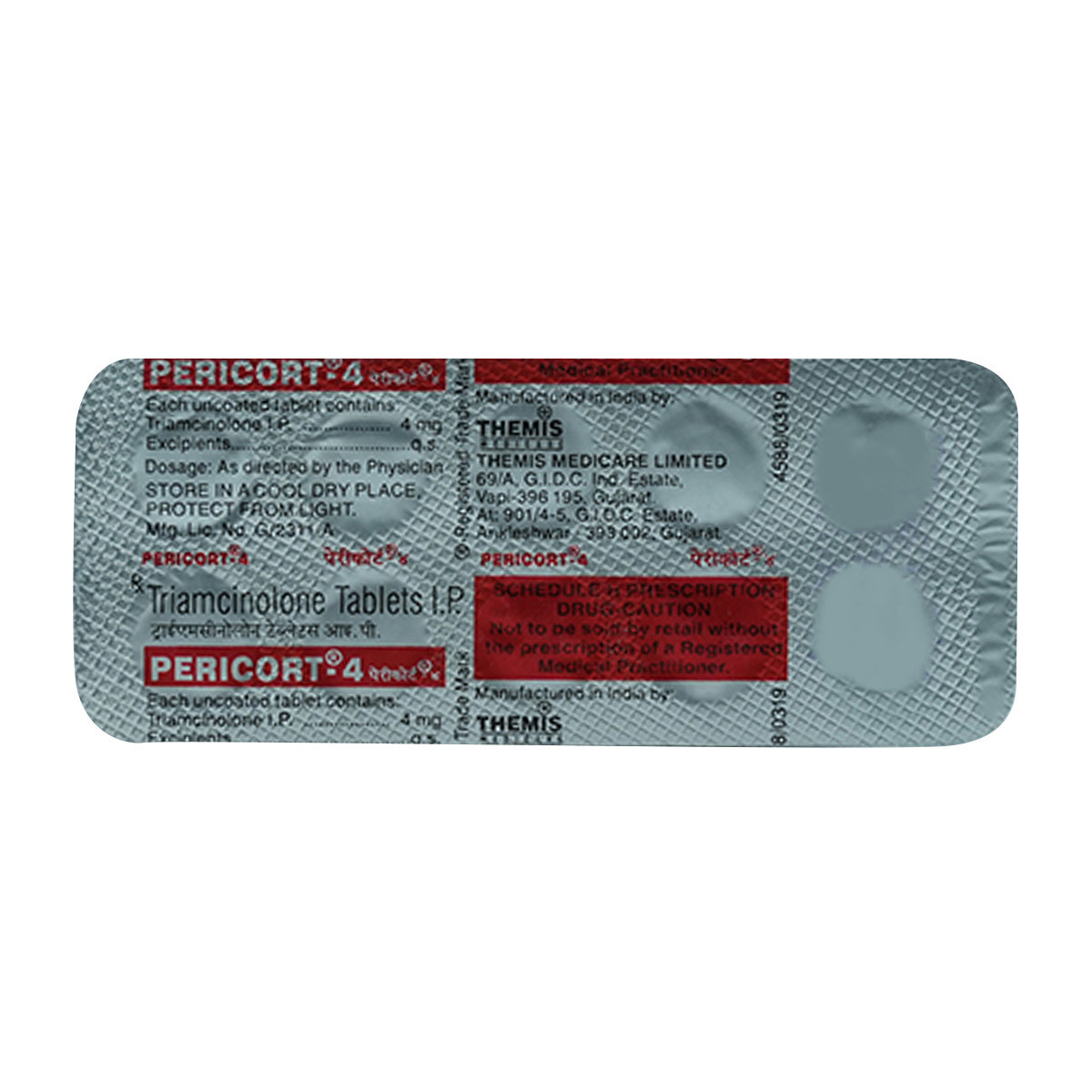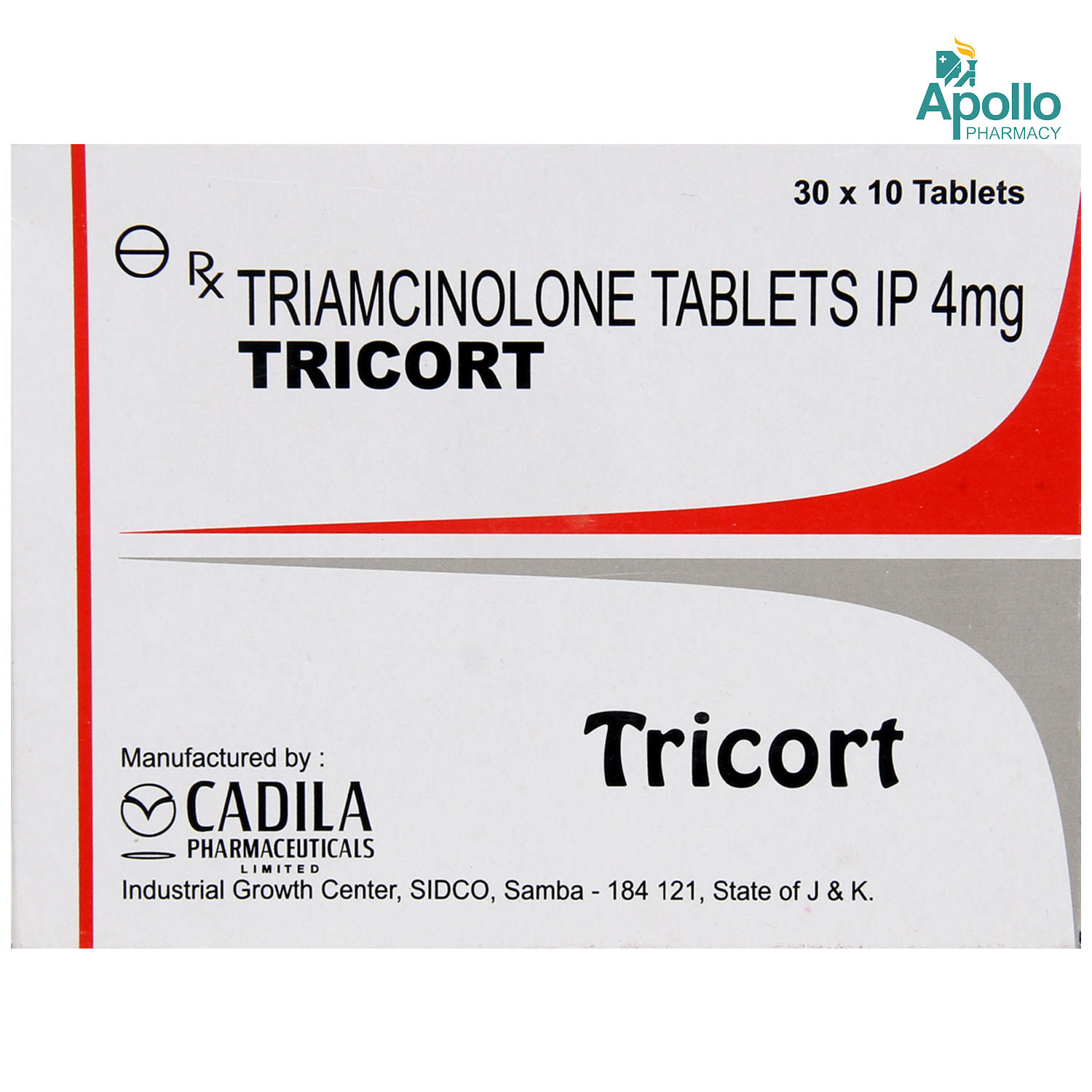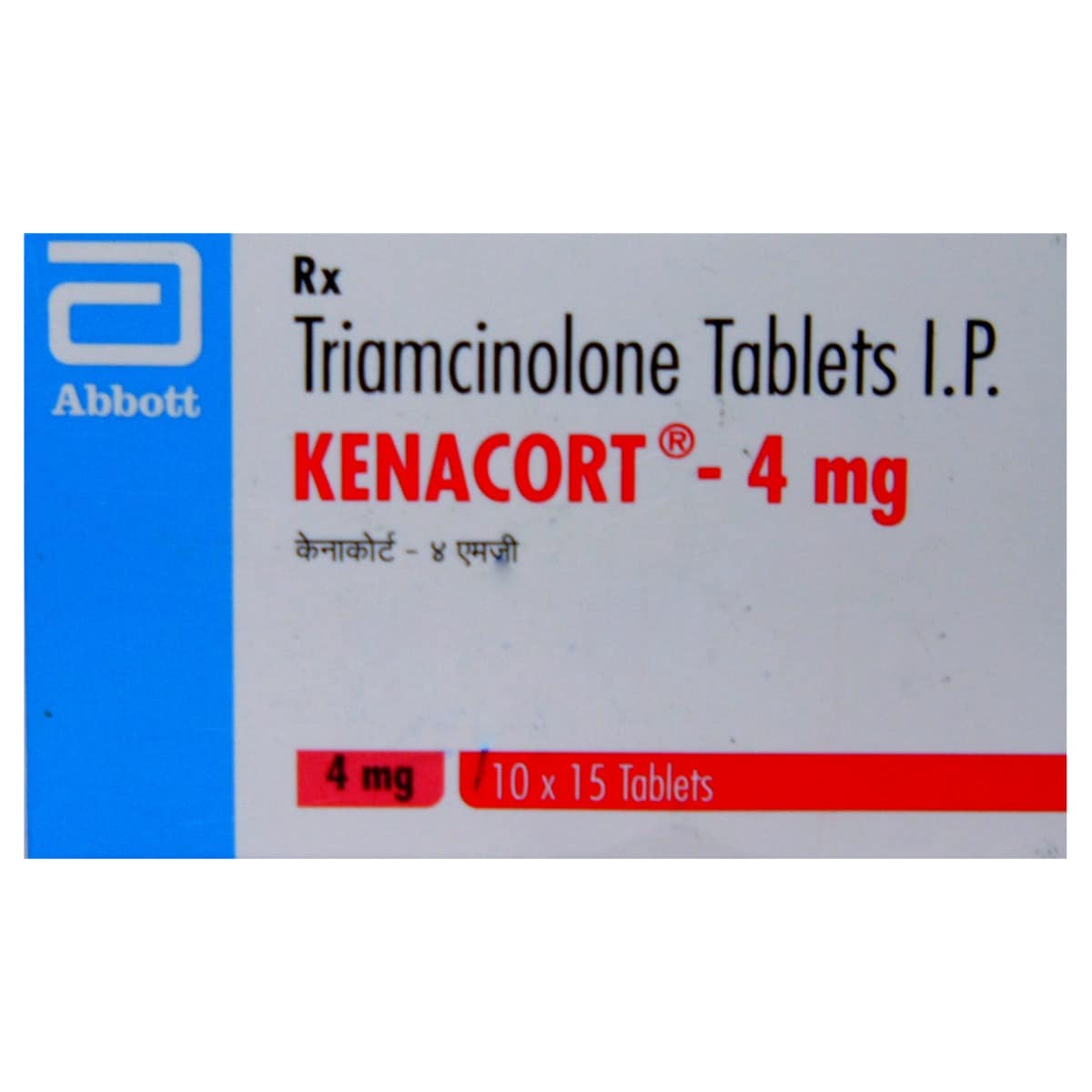Kenacort-4 mg Tablet
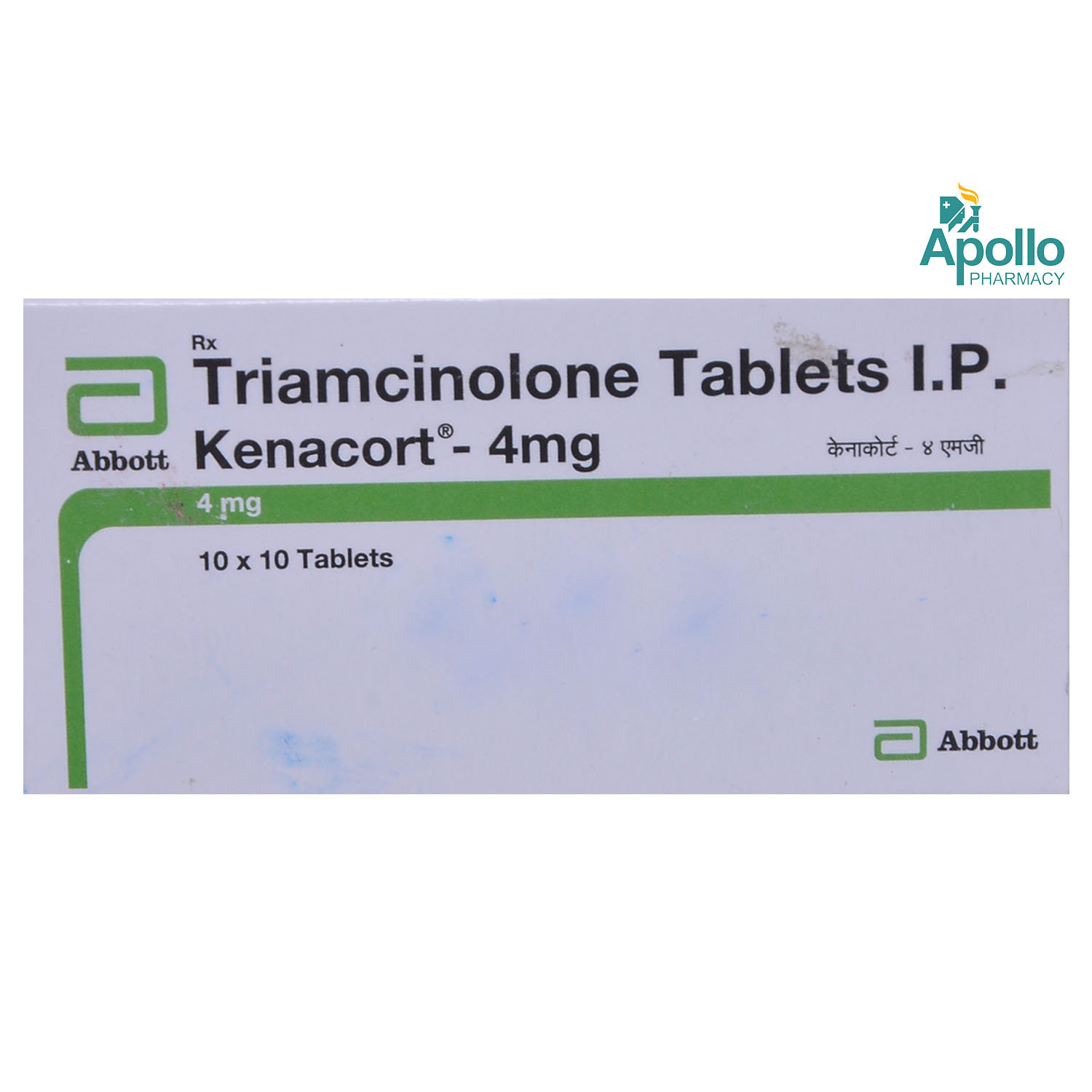
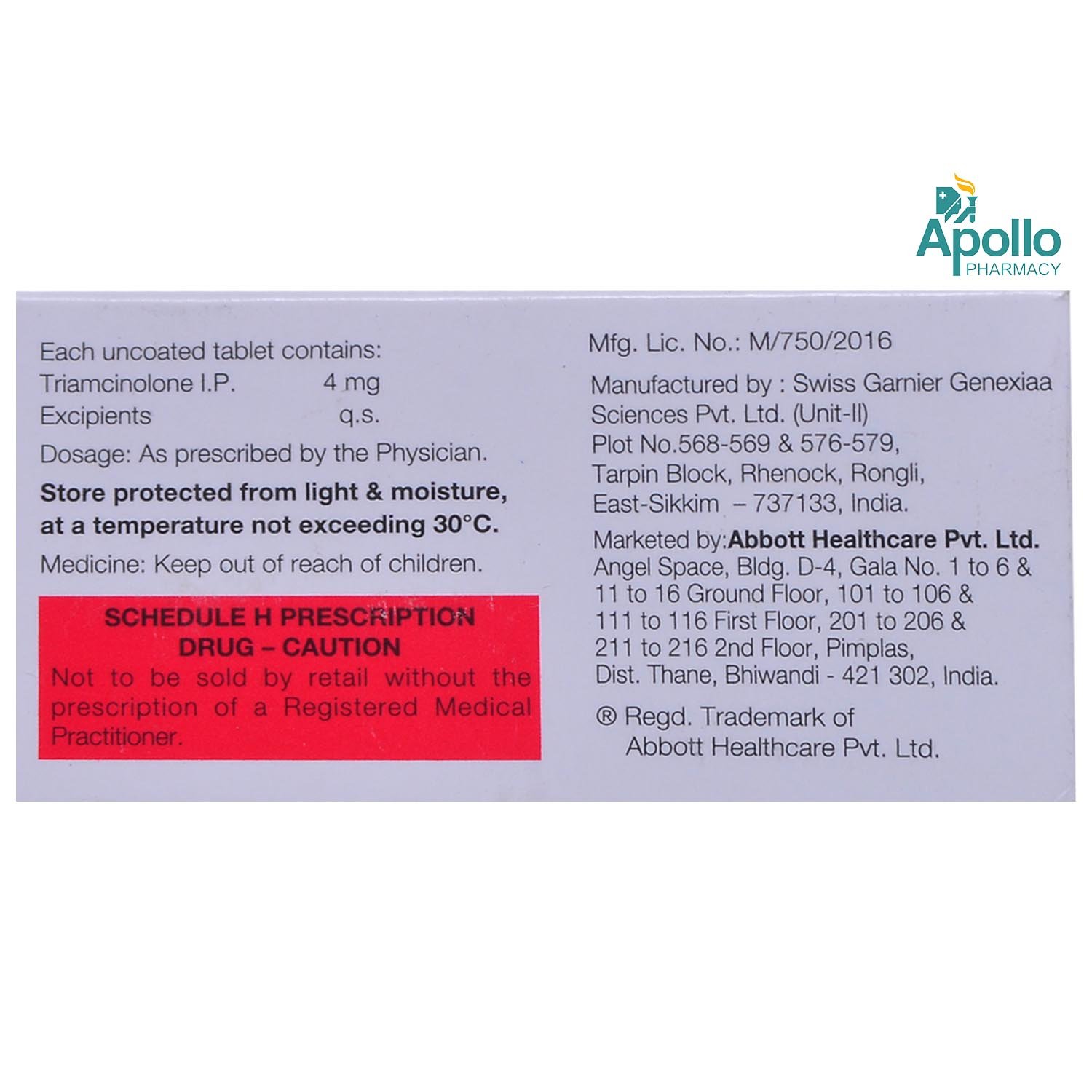
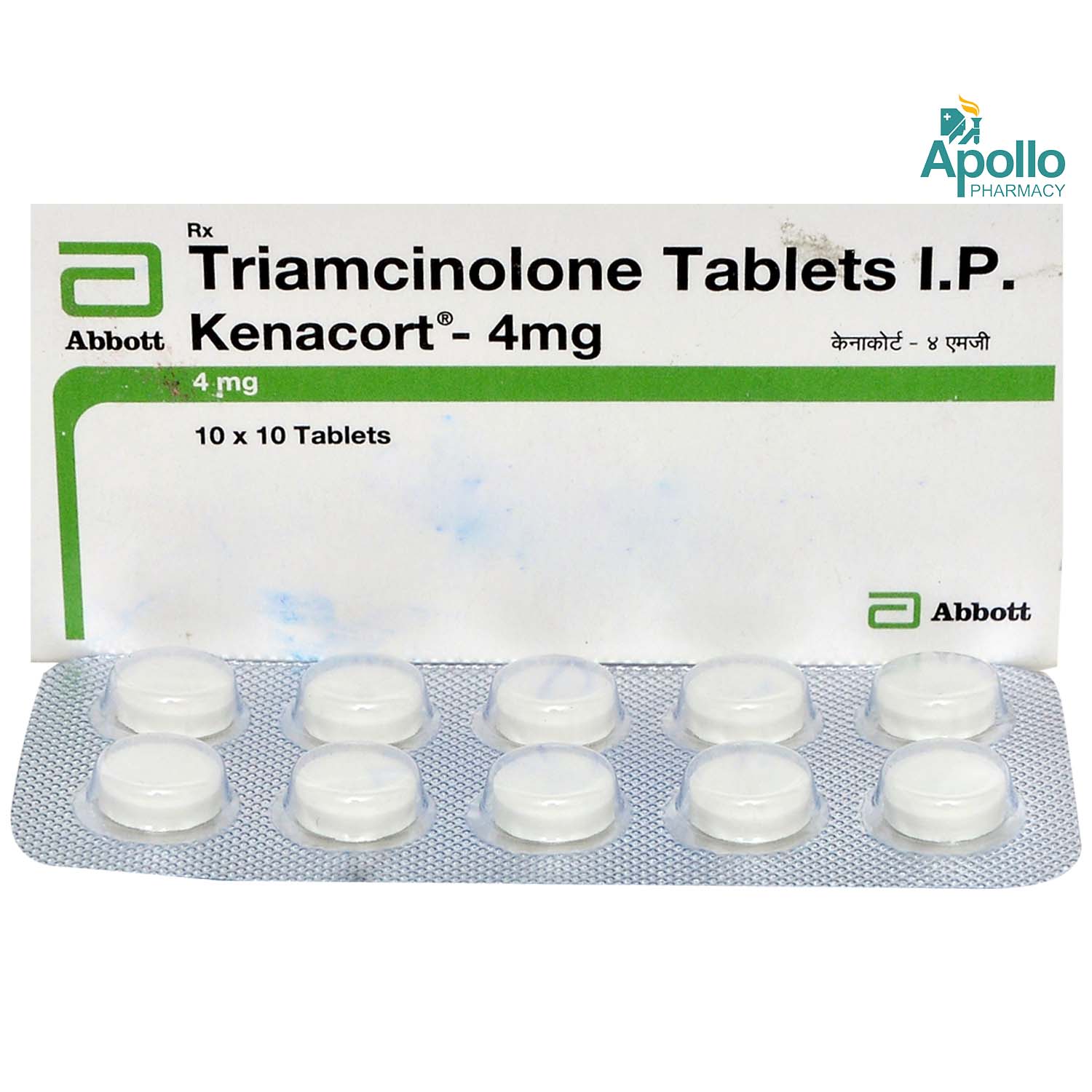
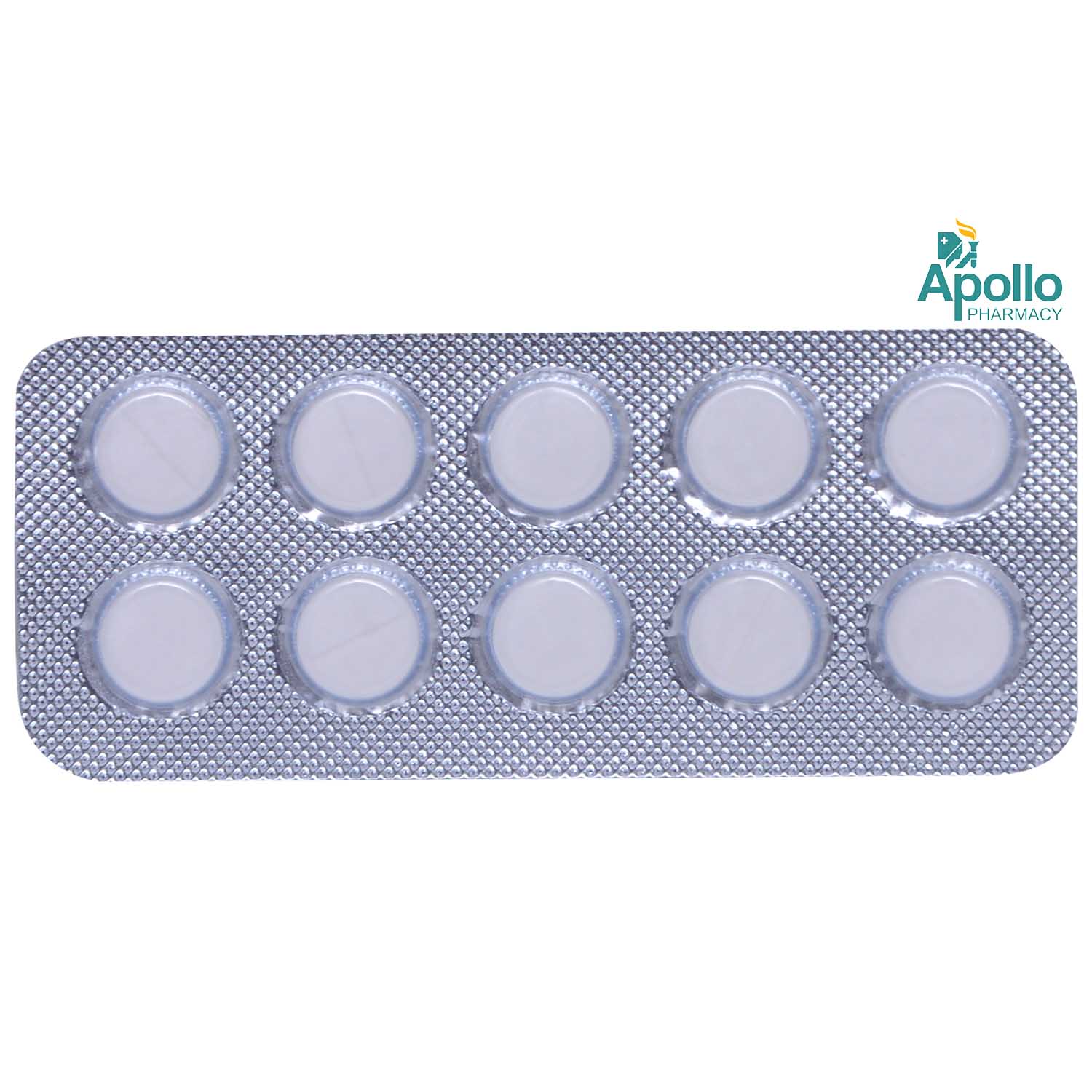
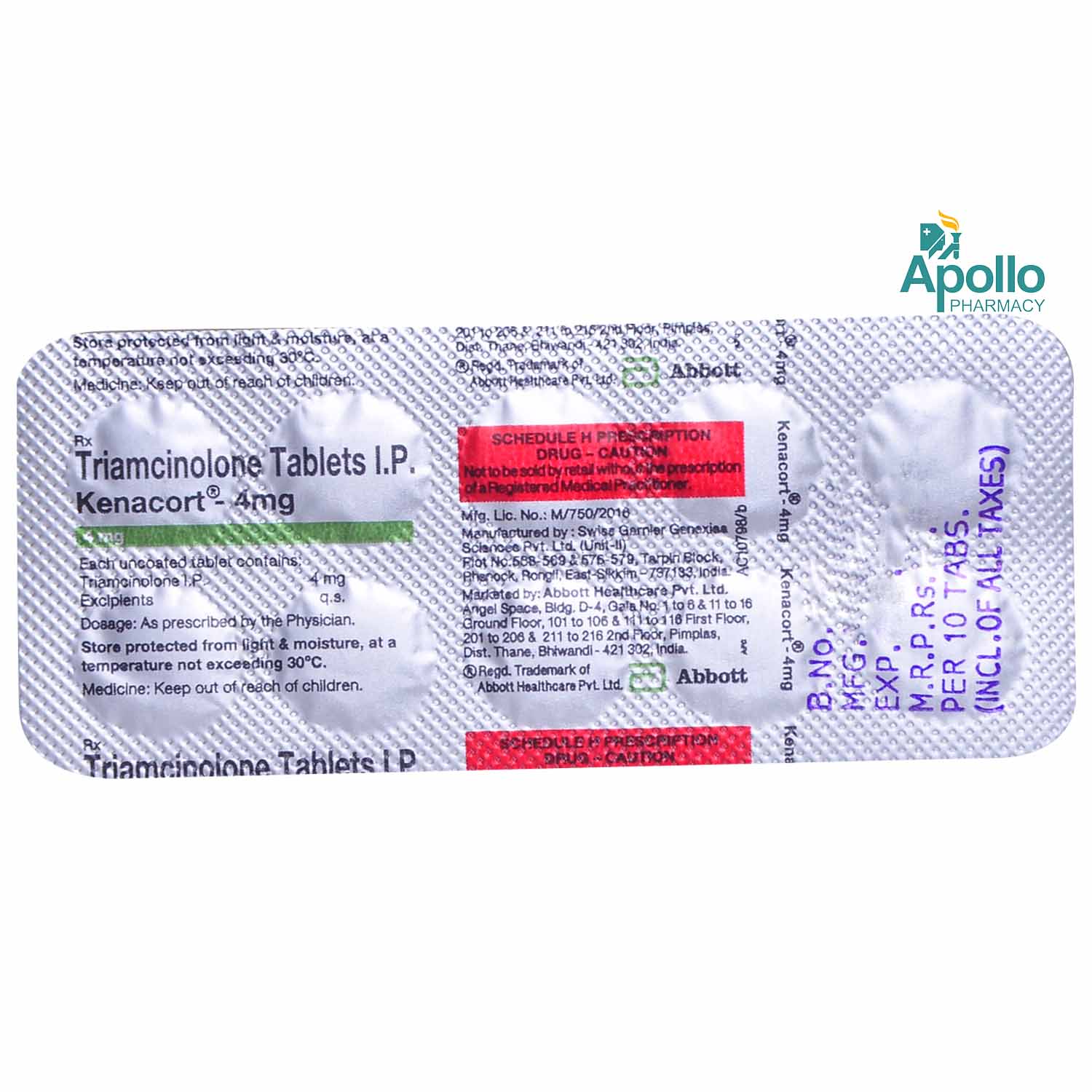
MRP ₹117.5
(Inclusive of all Taxes)
₹17.6 Cashback (15%)
know your delivery time
Provide Delivery Location
Composition :
Manufacturer/Marketer :
Consume Type :
Expires on or after :
Return Policy :
Selected Pack Size:10
10 ₹105.8
(₹10.58 per unit)
Out of stock
15 ₹149
(₹9.93 per unit)
In Stock

Secure Payment

Trusted by 8 Crore Indians

Genuine Products
Therapeutic Class
Country of origin
Manufacturer/Marketer address
FAQs
Disclaimer
Alcohol
Safe if prescribed
Avoid consumption of alcohol while on treatment Kenacort-4 mg Tablet as it may increase adverse effects.
Pregnancy
Consult your doctor
It is not known whether Kenacort-4 mg Tablet should be used in pregnant women. Hence, inform your doctor if you are pregnant or planning to become pregnant. Your doctor will recommend this medicine only if the benefits overweigh the potential risks.
Breast Feeding
Consult your doctor
It is not known whether Kenacort-4 mg Tablet passes in breast milk. Hence, inform your doctor if you are a nursing or breastfeeding mother. Your doctor will prescribe this medicine only if the benefits overweigh the potential risks.
Driving
Safe if prescribed
Kenacort-4 mg Tablet may cause dizziness. So, do not drive, operate heavy machinery or refrain from activities that require you to stay alert.
Liver
Consult your doctor
Let your doctor know if you have any history of liver disease before taking Kenacort-4 mg Tablet . Your doctor may adjust the dose of this medicine or prescribe a suitable alternative based on your condition.
Kidney
Consult your doctor
Let your doctor know if you have any history of kidney disease before taking Kenacort-4 mg Tablet . Your doctor may adjust the dose of this medicine or prescribe a suitable alternative based on your condition.
Children
Safe if prescribed
Kenacort-4 mg Tablet should be used in children only if clinically needed and prescribed by the pediatrician. however, long-term or frequent use should be avoided as this medicine may cause growth delay in children.
Product Substitutes
Reference
- https://www.drugs.com/pregnancy/triamcinolone.html
- https://dailymed.nlm.nih.gov/dailymed/fda/fdaDrugXsl.cfm?setid=ea6fac20-4c6b-42bb-8efd-c43458564fe7&type=display
- https://www.rxlist.com/oralone-drug.htm
- https://www.webmd.com/drugs/2/drug-75280/triamcinolone-acetonide-dental/details
- https://medlineplus.gov/druginfo/meds/a601122.html
About Kenacort-4 mg Tablet
Kenacort-4 mg Tablet belongs to a group of medications called ‘corticosteroids’ used in the treatment of various inflammatory and allergic disorders. It is used in the treatment of allergic rhinitis, asthma, rheumatoid arthritis, rheumatic carditis, hormone problems, ulcerative colitis, systemic lupus erythematosus, psoriasis, and other inflammatory conditions. It is also used in the treatment of mouth sores (painful lesions occurring in the lower lip or gums).
Kenacort-4 mg Tablet contains ‘triamcinolone’ which belongs to the class of ‘corticosteroids’. It controls inflammation by acting on the immune system. It decreases the activity of the immune system by blocking white blood cells (WBC) from attacking the body cells. It reduces the release of chemicals that cause inflammation. It causes constriction of blood vessels decreasing the access of cells to the site of injury. This effect helps in reducing swelling, pain and discomfort.
Kenacort-4 mg Tablet should be taken as advised by your doctor. The dose of the medicine will be decided by your doctor based on your health condition. Kenacort-4 mg Tablet may cause certain common side effects such as upset stomach, stomach irritation, vomiting, headache, dizziness, insomnia, restlessness, skin rash, vision problems, and weight gain. Most of these side effects do not require medical attention and gradually resolve over time. However, if the side effects persist or worsen, please consult your doctor.
Kenacort-4 mg Tablet should be avoided if you are allergic to it. Do not take Kenacort-4 mg Tablet more often or for a longer time than your doctor prescribed. Inform your doctor if you have diabetes, other skin infections or have undergone surgery. Inform your doctor if you develop any skin infection while using this medicine. This medicine weakens your immune system, so stay away from people who are sick. If you are pregnant or breastfeeding, talk to your doctor before using this medicine. Check with your doctor before taking vaccinations, as they may not work in people taking this medicine.
Uses of Kenacort-4 mg Tablet
Medicinal Benefits Mweb
Key Benefits
Kenacort-4 mg Tablet contains ‘triamcinolone’ which belongs to the class of ‘corticosteroids’. It is effectively used to treat various inflammatory, allergic and autoimmune diseases. It controls inflammation by acting on the immune system. It decreases the activity of the immune system by blocking white blood cells (WBC) from attacking the body cells (target cells). It reduces the release of chemicals that cause inflammation. It causes constriction (narrowing) of blood vessels, decreasing the access of cells to the site of injury. This effect helps in reducing swelling, pain and discomfort.
Directions for Use
Side Effects of Kenacort-4 mg Tablet
- Upset stomach
- Stomach irritation
- Vomiting
- Headache
- Dizziness
- Insomnia
- Restlessness
- Depression
- Gum irritation
Drug Warnings
Do not take Kenacort-4 mg Tablet if you are allergic to it. Inform your doctor about all the prescription and non-prescription medicines you are taking, including dietary or nutritional supplements. Inform your doctor if you have any serious illness or infection. This medicine weakens your immune system making you more prone to infections. So, keep a distance from people who are sick or have infections, especially chickenpox and measles. These conditions are life-threatening in people taking steroid medication. Check with your doctor before taking vaccinations, as they may not work in people taking this medicine. Do not stop taking this medicine abruptly, as it may cause withdrawal symptoms. Do not take Kenacort-4 mg Tablet more often or for a longer time than your doctor prescribed. Inform your doctor if you have diabetes, other skin infections or have undergone surgery. Inform your doctor if you develop any skin infection during treatment with this medicine.
Drug-Drug Interactions
Drug-Drug Interactions
Login/Sign Up
Using Mifepristone with Kenacort-4 mg Tablet can significantly reduce the effects of Kenacort-4 mg Tablet.
How to manage the interaction:
Taking Kenacort-4 mg Tablet with Mifepristone is not recommended but can be taken if prescribed by a doctor. However, if you notice any unusual symptoms contact a doctor. Do not discontinue any medications without consulting a doctor.
Co-administration of desmopressin together with Kenacort-4 mg Tablet may increase the risk of hyponatremia (a condition associated with low levels of salt in the blood).
How to manage the interaction:
Taking Kenacort-4 mg Tablet with Desmopressin is not recommended, but it should be taken if advised by a doctor. However, if you experience nausea, vomiting, headache, tiredness, irritability, difficulty concentrating, confusion, muscle spasm, weakness, , decreased urination and loss of appetite(less desire to eat), contact your doctor immediately. Do not discontinue any medications without consulting a doctor.
Using deferasirox together with Kenacort-4 mg Tablet may increase the risk of gastrointestinal ulcers and bleeding.
How to manage the interaction:
Although there is a possible interaction between deferasirox and Kenacort-4 mg Tablet, you can take these medicines together if prescribed by your doctor. However, if you experience abdominal pain, bloating, dizziness, lightheadedness, loss of appetite, nausea, vomiting (especially with fresh or dried blood that looks like coffee grounds), and red or black, tarry stools, contact your doctor right away. Do not discontinue any medications without consulting your doctor.
Taking bupropion with Kenacort-4 mg Tablet can increase the risk of seizures (fits).
How to manage the interaction:
Although there is an interaction between bupropion and Kenacort-4 mg Tablet, they can be taken together if prescribed by a doctor. Do not discontinue any medications without consulting a doctor.
Coadministration of Norfloxacin with Kenacort-4 mg Tablet can increase the risk or severity of tendinitis (inflammation of the tendons attached to the muscle and bones).
How to manage the interaction:
Taking Norfloxacin with Kenacort-4 mg Tablet together can result in an interaction, it can be taken if your doctor has advised it. However, if you experience Stiff joints or difficulty moving your joints, joint pains, Swelling, or skin discoloration, contact a doctor immediately. Do not discontinue any medications without consulting a doctor.
Taking Kenacort-4 mg Tablet with ceritinib may increase the blood levels of Kenacort-4 mg Tablet.
How to manage the interaction:
Although there is an interaction between Kenacort-4 mg Tablet and ceritinib, they can be taken together if prescribed by a doctor. However, consult a doctor if you experience muscle weakness, depression, acne, thinning skin, stretch marks, easy bruising, menstrual irregularities, or excessive growth of facial or body hair. Do not discontinue any medications without consulting a doctor.
Taking teriflunomide together with Kenacort-4 mg Tablet may increase the risk of serious infections.
How to manage the interaction:
Although there is an interaction between Kenacort-4 mg Tablet and teriflunomide, it can be taken together if prescribed by a doctor. Consult the doctor if you experience fever, chills, diarrhea, sore throat, muscle aches, shortness of breath, weight loss, red or inflamed skin, body sores, and pain or burning during urination. Do not discontinue medications until the doctor recommends it
Taking clarithromycin can cause higher levels of Kenacort-4 mg Tablet in the blood.
How to manage the interaction:
Although there is a possible interaction between Kenacort-4 mg Tablet and Clarithromycin, you can take these medicines together if prescribed by your doctor. However, if you experience swelling, weight gain, high blood sugar, weak muscles, feeling down, acne, thin skin, easy bruising, irregular periods, too much facial or body hair, strange fat distribution, contact your doctor right away. Do not stop using any medications without a doctor's advice.
Combining Kenacort-4 mg Tablet with Natalizumab can increase the risk of serious infection.
How to manage the interaction:
There may be a possibility of interaction between Kenacort-4 mg Tablet and Natalizumab, but it can be taken if prescribed by a doctor. However, If you experience fever, chills, diarrhea, sore throat, muscle aches, shortness of breath, blood in phlegm, weight loss, red or inflamed skin, body sores, and pain or burning during urination contact your doctor right away. Do not discontinue any medications without consulting your doctor.
When Kenacort-4 mg Tablet is taken with Voriconazole may significantly increase the blood levels of Kenacort-4 mg Tablet.
How to manage the interaction:
Taking Kenacort-4 mg Tablet with Voriconazole together can result in an interaction, but it can be taken if your doctor has advised it. However, if you have any of these symptoms - headache, feeling sick, trouble seeing, sensitivity to light, or ringing in your ears - make sure to contact a doctor right away. Do not discontinue any medications without consulting a doctor.
Drug-Food Interactions
Drug-Food Interactions
Login/Sign Up
Drug-Diseases Interactions
Drug-Diseases Interactions
Login/Sign Up
Drug-Drug Interactions Checker List
- ITRACONAZOLE
- KETOCONAZOLE
- CLARITHROMYCIN
- TELITHROMYCIN
- RIFAMPICIN
- NEFAZODONE
- CYCLOSPORINE
- PHENYTOIN
- PHENOBARBITAL
- THEOPHYLLINE
- DIGOXIN
Habit Forming
Special Advise
If you are undergoing any skin tests, inform your doctor before taking Kenacort-4 mg Tablet , your doctor may suggest stopping the use of Kenacort-4 mg Tablet a couple of days before the tests.
Diet & Lifestyle Advise
- Eat a healthy and balanced diet, and make sure you sleep at least 8 hours a day for a speedy recovery.
- Try to include heart-healthy omega-3 fatty acid-containing food drinks in your daily diet. You can also use low-fat cooking oil like olive oil, soybean oil, canola oil and coconut oil.
- Contact with any person who has chickenpox, measles, or tuberculosis should be avoided as it might cause you the same infection as Kenacort-4 mg Tablet makes your body prone to infections.
- Option for food and drinks high in Omega 3 fatty acid to get relief from pain, swelling and inflammation. Omega 3 fatty acid-enriched foods include flaxseeds, walnut, soybean oil, salmon and tuna fish if you prefer non-veg.
- Prefer whole foods and grains instead of processed ones. Limiting starch may also help decrease inflammation.
- Avoid intake of processed foods, foods high in sugar and fat, as these may cause inflammation.
- Limit salt intake and prefer herbs or spices like garlic, ginger and turmeric, a natural anti-inflammatory.
- Avoid alcohol consumption as it can affect your stomach and intestine and limit the absorption of the important nutrients required by your body.
All Substitutes & Brand Comparisons
RX
Out of StockTacit 4mg Tablet
₹30
(₹2.7 per unit)
74% CHEAPERRX
Out of StockMericort 4mg Tablet
Meridian Medicare Ltd
₹32
(₹2.88 per unit)
72% CHEAPERRX
Out of StockPericort 4mg Tablet 10's
Themis Chemicals Ltd
₹41
(₹3.69 per unit)
65% CHEAPER

Have a query?
Buy best Endocrine System products by
Macleods Pharmaceuticals Ltd
Abbott India Ltd
Intas Pharmaceuticals Ltd
Sun Pharmaceutical Industries Ltd
Lupin Ltd
Elder Pharmaceuticals Ltd
Leeford Healthcare Ltd
Samarth Life Sciences Pvt Ltd
East West Pharma India Pvt Ltd
Pfizer Ltd
Alteus Biogenics Pvt Ltd
GlaxoSmithKline Pharmaceuticals Ltd
Icon Life Sciences
Neon Laboratories Ltd
Eris Life Sciences Ltd
Knoll Healthcare Pvt Ltd
Mankind Pharma Pvt Ltd
Morepen Laboratories Ltd
Wockhardt Ltd
Micro Labs Ltd
Primus Remedies Pvt Ltd
Cipla Ltd
Prevego Healthcare & Research Pvt Ltd
Scudder Life Sciences Pvt Ltd
United Biotech Pvt Ltd
AAA Pharma Trade Pvt Ltd
Ferring Pharmaceuticals Pvt Ltd
Merck Ltd
Olcare Laboratories Pvt Ltd
Erinyle Pharma
Novartis India Ltd
Sanatra Healthcare Ltd
Zydus Cadila
Zydus Healthcare Ltd
Clamed Healthcare Pvt Ltd
Comed Pharma
Geneaid Pharmaceuticals
Gland Pharma Ltd
Lyceum Life Sciences Pvt Ltd
Regenix Drugs Ltd
Rockmed Pharma Pvt Ltd
Torrent Pharmaceuticals Ltd
Vasu Organics Pvt Ltd
Zee Laboratories Ltd
Alkem Laboratories Ltd
Alna Biotech Pvt Ltd
Ankaa Pharmaceutical
Atlantis Pharmacorp Inc
Cadila Healthcare Ltd
Chemo Biological Ltd
Corazon Pharma Pvt Ltd
Corona Remedies Pvt Ltd
GLS Pharma Ltd
Hetero Drugs Ltd
Icarus Health Care Pvt Ltd
Ikon Pharmachem
Intra Labs India Pvt Ltd
K C Laboratories
Kabson Medicare
Knoll Pharmaceuticals Ltd
Levin Life Sciences Pvt Ltd
Medopharm Pvt Ltd
Nitro Organics Pvt Ltd
Novo Nordisk India Pvt Ltd
Oaknet Healthcare Pvt Ltd
Overseas Health Care Pvt Ltd
Praise Pharma
Proxima Healthcare
Rhumasafe Pharma
Serum Institute Of India Pvt Ltd
Solas Healthcare
Solis Pharmaceuticals
Startos Healthcare Pvt Ltd
Swisskem Healthcare
Troikaa Pharmaceuticals Ltd
Trumac Healthcare
Wallace Pharmaceuticals Pvt Ltd
Waylon Biotech Pvt Ltd
Actus Health Care
Adonis Laboratories Pvt Ltd
Aeobury Healthcare Pvt Ltd
Aequitas Healthcare Pvt Ltd
Akumentis Healthcare Ltd
Alathea Biotec Pvt Ltd
Alexpen Remedies
Allergan Healthcare India Pvt Ltd
Arinna Lifesciences Ltd
Azillian Healthcare Pvt Ltd
Baxium Healthcare
Bioceutics Inc
Biochemix Health Care Pvt Ltd
Biocute Life Care
Biohexol Lifesciences
Biokindle Lifesciences Pvt Ltd
Biosync Pharmaceutical Pvt Ltd
Brochem Health Care Pvt Ltd
Cadila Pharmaceuticals Ltd
Capital Pharma
Capri Pharmaceuticals Pvt Ltd
Celon Laboratories Pvt Ltd


